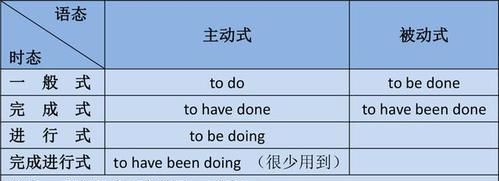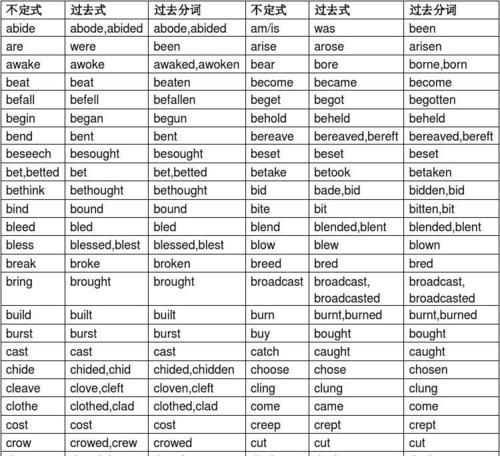本文目录
动词不定式单词表
下列动词或词组后面都可以接doing:
enjoy 喜欢
finish 完成
mind 介意
miss 想念
practice 训练
face 面对
stand 忍受
understand 理解
keep 继续
例如:Would you mind turning down your radio a little, please? 你把收音机音量调小一点,好吗
The squirrel was lucky that it just missed being caught. 这松鼠幸运得很,刚逃避了被逮住的厄运。
admit to
prefer…to
be used to
lead to
devote oneself to
object to
stick to
no good
no use
be fond of
look forward to
be proud of
be busy
can't help
be tired of
be capable of
be afraid of
think of
burst out
keep on
insist on
count on
set about
put off
be good at
take up
give up
be successful in
下列动词或词组都可以用不定式:
afford
agree
ask
decide
care
choose
hope
fail
help
learn
long 渴望
mean
manage
plan
pretend
tend
hate
例如:
The driver failed to see the other car in time. 司机没能及时看见另一辆车。
He offered to help me. 他表示愿意帮助我。
需要省略to的不定式的情况有:
1) 情态动词 ( 除ought 外) 后。
2) 使役动词 let, have, make后,感官动词 see, watch, look at, notice , observe, hear, listen to, smell, feel, find 等后。
注意:被动语态中不能省去to。例如:
I saw him dance. 我看见他跳舞。
=He was seen to dance.
The boss made them work the whole night. 老板让他们整夜干活。
=They were made to work the whole night.
3) would rather,had better句型后
4) Why… / why no…句型后
5) help 后可带to,也可不带to, help sb (to) do sth:
6) but和except后。but前是实义动词do时,后面出现的不定式不带to。
比较:He wants to do nothing but go out. 他只想出去玩。
He wants to believe anything but to take the medicine. 除了吃这药,他什么都信。
7) 由and, or和than连接的两个不定式,第二个to 可以省去:
8) 通常在discover, imagine, suppose, think等词后作宾补时,可以省去to be。例如:
He is supposed (to be) nice. 他应该是个好人。
一些重要的区分:
1) stop doing/to do
stop to do 停止,中断做某事后去做另一件事,stop doing 停止做某事。例如:
They stop to smoke a cigarette. 他们停下来,抽了根烟。
I must stop smoking. 我必须戒烟了。
2)forget doing/to do
forget to do 忘记要去做某事,forget doing 忘记做过某事。例如:
The light in the office is stil on. He forgot to turn it off. 办公室的灯还在亮着,他忘记关了。(没有做关灯的动作)
He forgot turning the light off. 他忘记他已经关了灯了。(已做过关灯的动作)
3)remember doing/to do
remember to do 记得去做某事,remember doing 记得做过某事。例如:
Remember to go to the post office after school. 记着放学后去趟邮局。
Don't you remember seeing the man before? 你不记得以前见过那个人吗?
4)regret doing/to do
regret to do 对将要做的事遗憾,regret doing 对做过的事遗憾、后悔。例如:
I regret to have to do this, but I have no choice. 我很遗憾必须这样去做,我实在没有办法。
I don't regret telling her what I thought. 我不为告诉她我的想法而后悔。
5)cease doing/to do
cease to do 长时间,甚至永远停做某事,cease doing 短时停止做某事,以后还会接着做。例如:
That department has ceased to exist forever. 那个系已不复存在。
The girls ceased chatting for a moment when their teacher passed by. 姑娘们在老师走过时,停了会聊天
6)try doing/to do
try to do 努力,企图做某事,try doing 试验,试着做某事。例如:
You must try to be more careful. 你可要多加小心。
I tried gardening but didn't succeed. 我试着种果木花卉,但未成功。
7)go on doing/to do
go on to do 做了一件事后,接着做另一件事,go on doing 继续做原来做的事。例如:
After he had finished his maths,he went on to do his physics. 做完数学后,他接着去做物理。
Go on doing the other exercise after you have finished this one. 作完这个练习后,接着做其他的练习
8)be afraid doing/to do
be afraid to do 不敢,胆怯去做某事,是主观上的原因不去做,意为"怕",be afraid of doing 担心出现doing的状况、结果。doing 是客观上造成的,意为"生怕,恐怕"。例如:
She was afraid to step further in grass because she was afraid of being bitten by a snake.
她生怕被蛇咬着,不敢在草丛中再走一步。
She was afraid to wake her husband. 她不敢去叫醒她丈夫。
She was afraid of waking her husband. 她生怕吵醒她丈夫。
9)be interested doing/to do
interested to do 对做某事感兴趣,想了解某事,interested in doing 对某种想法感兴趣,doing 通常为想法。例如:
I shall be interested to know what happens. 我很想知道发生了什么事。(想了解)
I'm interested in working in Switzerland. Do you have any idea about that?
我对在瑞士工作感兴趣。你想过这事吗? (一种想法)
10) mean to doing/to do
mean to do 打算、想,mean doing 意味着。例如:
I mean to go, but my father would not allow me to. 我想去,但是我父亲不肯让我去。
To raise wage means increasing purchasing power. 增加工资意味着增加购买力。
11)begin(start) doing/to do
begin / start to do sth /begin / start doing sth.
a) 谈及一项长期活动或开始一种习惯时,使用doing。例如:
How old were you when you first started playing the piano? 你几岁时开始弹钢琴?
b) begin, start用进行时时,后面动词用不定式to do。例如:
I was beginning to get angry。我开始生起气来。
c) 在attempt, intend, begin, start 后接know, understand, realize这类动词时,常用不定式to do。例如:
I begin to understand the truth。我开始明白真相。
d) 事物作主语时。例如:
The snow began to melt.雪开始融化了
12)感官动词 + doing/to do
感官动词 see, watch, observe, notice, look at, hear, listen to, smell, taste, feel + do表示动作的完整性,+doing 表示动作的进行性。例如:
I saw him work in the garden yesterday. 昨天我看见他在花园里干活了。(强调"我看见了"这个事实)
I saw him working in the garden yesterday.(强调"我见他正干活"这个动作)昨天我见他正在花园里干活

不定代词加不定式
一般两个动词放在一起时,前面的作谓语,后面的就用不定式,特殊单词有要求的除外,有些只要求接动名词.评价的形容词。例:It’srightofhimtorefusethe
invitation.(him为逻辑主语)
2、表语:Ourdutyistoprotecttheenviroment.
3、动词宾语:此种情况可按固定搭配或句式去记。
例:wouldyouliketoseemyphotos?Kevinplannedtovisithisuncle.(book4,L11)
和plan用法一样的词还有:start,want,agree,hope,begin,decide等。
Ifounditverydifficulttogeta
job.(it为形式宾语)4、宾语补足语:(1)在多数复合宾语及物动词后要带to:例:Iaskedafriendtoreadittome.(book4,L2)(2)在表示感觉、致使等意义的动词
(see,watch,hear,feel,notice,observe,
make,let,have,help等)后不带to。例:Theyheardhimsingapopsonginthemeetingroom.
5、定语:动词不定式做定语放在所修饰的名词的后面。
例:Vinnyisthefirstdisabledper鄄sontosailaroundtheworld.(book4,
L1)6、形容词补足语:在表示心理、感情、评价等的形容词后,对其进行补充说明。
例:Weareverygladtomeetyouagain.
7、状语:表示目的、原因、程度等。
例:Theybroughtinphotosoftheir
familiesformetolookat.(book4,L2)
8、“疑问词+不定式”用法:不定式前可带what,who,which,where,when,how等疑问词,这种不定式短语在句中多用做宾语。
例:Hedidn’ttellmewheretogo.9、在初中阶段还涉及到“不定式被动语态一般式(tobe+过去分词)”
例:Therearetwentymoretreestobeplanted.
解读动词不定式作主语、宾语、定语、状语
在中学教科书中,动词不定式是一个非常重要的语法点;在历年高考中,动词不定式是频频考查的要点之一;在学生的学习实践中,动词不定式是琐碎、难学的语法项目之一。为了更熟练、准确、有针对性地掌握此项语法知识,下面把(N)MET对动词不定式作主语、宾语、定语及状语的考查点进行总结、归纳。
I. 不定式作主语
1. 不定式作主语时,常用it作形式主语,而将作主语的不定式放在句子后部。例如:
It is good to help others.帮助他人是件好事。
It is exciting to surf the Internet.上网是件令人兴奋的事。
2. 不定式作主语与V-ing形式作主语的不同:前者作主语时,常表示某一次具体的动作;而后者常表示习惯性的动作。例如:
To teach the three children is my job this afternoon. 教这三个孩子是今天下午我的工作。
Walking is a good form of exercise. 散步是锻炼的一种好方式。
简析: It's ... of sb. to do sth.与It's... for sb. to do sth.
当表语形容词说明不定式的逻辑主语具有某种品质时,常用"It's...of sb. to do sth."。例如:
It's very kind / nice of you to help me。感谢你的帮助。
当表语形容词说明不定式具有某种特征时,应使用 "It's ...for sb. to do sth."。例如:
It's hard for the Chinese students to learn Russian. 中国学生学俄语是很难的。
[高考题例]
1. Is ________ necessary to complete the design before National Day?
A. this B. that C. it D. he
2. It was foolish ________ you to give up what you rightly owned.
A. for B. of C. about D. from
II. 不定式作宾语
1. 学习不定式作宾语时,要注意掌握四种动词:
1) 后接不定式作宾语的动词。常见动词有: offer, decide, hope, promise, agree, plan, manage, refuse, wish, pretend, learn, want等。
2) 后接V-ing形式作宾语的动词。常见动词有: enjoy, mind, suggest, advise, finish, practise, imagine, admit, avoid, delay等。
3)后接不定式和V-ing形式作宾语均可,且没有大的区别的动词。常见动词有: start, begin, continue等。
4)后接不定式和V-ing形式作宾语均可,但意思不同的动词。常见动词及短语有:try, remember, forget, regret, stop, go on等。例如:
Please remember to lock the door when you go out. 出去时请记住要锁门。
I don't remember lending you any money. 我不记得借过钱给你。
I regret saying what I said. I shouldn't have said it. 我后悔我所说过的话,我本不该说那些话。
I regret to tell you that you failed your driving test. 我很遗憾地告诉你,你没有通过驾驶测试。
The minister went on talking for two hours. 部长的讲话持续了两个小时。
After discussing the economy, the minister then went on to talk about foreign policy. 讨论完经济,部长接着谈论外交政策。
2. 动词不定式在句中作宾语,如带有宾语补足语时,要先用it作形式宾语,而将该不定式后置。例如:
I don't think it right to do it in that way.我觉得以那种方式去做是不恰当的。
I find it hard to get along with him. 我发现与他相处不是件容易的事。
3. "疑问代词、疑问副词 + 不定式"常常用作动词或介词的宾语。例如:
I don't know where to spend my holiday. 我不知该去哪儿度假。
Have you decided when to marry?你决定什么时候结婚了吗?
[高考题例]
3. She pretended ________ me when I passed by.
A. not to see B. not seeing C. to not see D. having not seen
4. Little Jim should love ________ to the theatre this evening.
A. to be taken B. to take C. being taken D. taking
5. -I usually go there by train.
-Why not ________ by boat for a change?
A. to try going B. trying to go C. to try and go D. try going
6. -Was the test difficult?
-Not at all. We found ________ .
A. it very easy for doing
B. very easy to do it
C. it very easy to do
D. it very easy to do it
7. -Do you know Mr. Smith?
-Yes. He's a strange man. We found ________ difficult to work with him.
A. us B. it C. him D. you
8. I don't think ________ possible to master a foreign language without much memory work.
A. this B. that C. its D. it
9. Last summer I took a course on ________ .
A. how to make dresses
B. how dresses be made
C. how to be made dresses
D. how dresses to be made
10. It is said in Australia there is more land than the government knows ________ .
A. it what to do with
B. what to do it with
C. what to do with it
D. to do what with it
III. 不定式作定语
不定式作定语时,应注意使用不定式的正确形式。请看下列句子:
I have a lot of work to do today. 我今天有很多工作要(自己)做。
I have a lot of work to be done today. 我今天有很多工作要(别人)做。
Do you have anything to take to your son? 你有什么东西要(自己)带给你儿子吗?
百度专家组为您解答,请按一下手机右上角的采纳!谢谢!

英语所有单词的过去式和不定式
不定式,顾名思义就是动词的不定的形式,有两个意义:
一是标志后面的词为动词原形,一是标志该词的动作(一般)发生于将来,所以你列出的那些词都是动词原形,每一个词前边写上to 就是它的不定式形式了,如:go 的不定式形式为to go,buy的不定式形式为to buy,等等。
懂了吗?

不定式的英语单词
1. 不定式定义:由to+动词原形构成。 不定式是一种非限定性动词。而非限定动词是指那些在句中不能单独充当谓语的动词,可分为不定式,动名词,现在分词和过去分词。
求采纳

以上就是关于不定式单词有哪些 ,动词不定式单词表的全部内容,以及不定式单词有哪些 的相关内容,希望能够帮到您。
